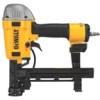Dewalt DWSL18CAP Instruction Manual - Page 6
To Avoid Double Fires
 |
View all Dewalt DWSL18CAP manuals
Add to My Manuals
Save this manual to your list of manuals |
Page 6 highlights
English • Keep hands and body parts clear of FIG. Q immediate work area. Hold workpiece with clamps when necessary to keep hands and body out of potential harm. Be sure the workpiece is properly secured before pressing the stapler against the material. The contact trip may cause the work material to shift unexpectedly. (Fig. Q) • Do not use tool in the presence of FIG. R flammable dust, gases or fumes. The tool may produce a spark that could ignite gases causing a fire. Driving a fastener into another fastener may also cause a spark. (Fig. R) • Keep face and body parts away from back of the tool cap when working in restricted areas. Sudden recoil can result in impact to the body, especially when stapling into hard or dense material. FIG. S (Fig. S) • Grip tool firmly to maintain control while allowing tool to recoil away from work surface as fastener is driven. In "Contact Actuation Mode" if contact trip is allowed to recontact work surface before trigger is released an unwanted fastener will be fired. • Choice of triggering method is important. Check the manual for triggering options. CONTACT ACTION TRIGGER FIG. T • When using the contact action trigger, be careful of unintentional double fires resulting from tool recoil. Unwanted fasteners may be driven if the contact trip is allowed to accidentally re-contact the work surface. (Fig. T) TO AVOID DOUBLE FIRES: • Do not engage the tool against the work surface with a strong force. • Allow the tool to recoil fully after each actuation. • Use sequential action trigger. • When "contact" actuating the stapler, always keep tool in control. Inaccurate placement of tool can result in misdirected discharge of a fastener. SEQUENTIAL ACTION TRIGGER • When using the sequential action trigger, do not actuate the tool unless the tool is placed firmly against the workpiece. • DEPTH ADJUSTMENT: To reduce risk of serious injury from accidental actuation when attempting to adjust depth, ALWAYS; • Disconnect air supply • Avoid contact with trigger during adjustments 4















